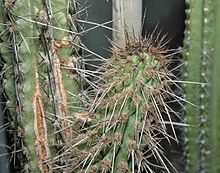Eulychnia
From Wikipedia, the free encyclopedia
| Eulychnia | |
|---|---|
 | |
| Eulychnia castanea | |
| Scientific classification | |
| Kingdom: | Plantae |
| (unranked): | Angiosperms |
| (unranked): | Eudicots |
| (unranked): | Core eudicots |
| Order: | Caryophyllales |
| Family: | Cactaceae |
| Subfamily: | Cactoideae |
| Tribe: | Notocacteae |
| Genus: | Eulychnia Phil. |
| Species | |
|
Eulychnia acida | |
Eulychnia is a genus of candelabriform or arborescent cacti, comprising between 6 and 9 species depending on the authority. These desert cacti can survive under very hot conditions—temperatures can reach up to 50 degrees Celsius. Furthermore, this breed of cacti can also survive in some of the driest places in the world such as the Atacama Desert, the driest desert in the world.
This genus has one synonym: Philippicereus Backeb..
| Wikimedia Commons has media related to Eulychnia. |
This article is issued from Wikipedia. The text is available under the Creative Commons Attribution/Share Alike; additional terms may apply for the media files.